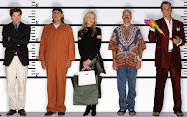Things that didn't work in this episode: Oh, where to begin. (1) First of all, the storyline was absurd. Whitney Houston exploded into the mainstream back in 1992 with Bodyguard, and every time someone tries to reimagine this plot, I can't help but think any version thereafter is "the poor man's Bodyguard." The 1992 film is far from perfect, but it doesn't seem like anyone really expands on the basic plot. Here, Dollhouse tries to put a twist on a familiar tale (which they did last week with "The Most Dangerous Game"), but the "twist" is that the singer, Rayna, actually wants to die and -- get this -- has a pact with her psychopath killer. He kills her during a show, and she is set free. The biggest problem I have with this is... the show doesn't explore how Rayna feels trapped. So she has to pretend to be happy and grateful all of the time. So she is "factory made" (which should have been a nice parallel to Echo's own factory manufacturing, but it seemed so blatant and obvious that I wish it hadn't actually been written into the script).* But so what? Why did she feel like she couldn't simply quit the business?
* To be fair, Fox is notorious for dumbing down scripts so that it reaches the lowest common denominator, and Fox, time and time again (see Terminator: The Sarah Connor Chronicles and House), has shown that they think that denominator is the shared IQ of 95, and no one can pick up on visual signs; everything must be spelled out verbally. It makes deconstructing this text entirely unengaging because Fox wants the message and purpose of the episode to be written in the very delivery of it.
 Besides the narrative itself, and the grossly overdone unappreciative diva stereotype, (2) Tahmoh Penikett is still being underutilized. In the same way that Chuck had a problem incorporating the Buy More into the agent action in season one, Dollhouse is having trouble integrating Ballard's quest into the major A-storyline adventures of Echo. Although, to this episode's credit, revealing that the Russian leak was an active doll was refreshing and did offer a bridge -- though faint and minor -- between the two story arcs. But during the fight sequence between Ballard and those nameless/faceless mobsters, I found myself cheering for Helo (rather than Ballard), which may be more my fault than the show's, but Ballard's character has not been developed enough for me to care about him. Why is he so intent on finding the Dollhouse? Did he have a run-in with Echo in the past? I find it hard to believe that his sole determination hinges on secret clues left by a mysterious third party. We're three episodes in now, and we still don't know what motivates Ballard.
Besides the narrative itself, and the grossly overdone unappreciative diva stereotype, (2) Tahmoh Penikett is still being underutilized. In the same way that Chuck had a problem incorporating the Buy More into the agent action in season one, Dollhouse is having trouble integrating Ballard's quest into the major A-storyline adventures of Echo. Although, to this episode's credit, revealing that the Russian leak was an active doll was refreshing and did offer a bridge -- though faint and minor -- between the two story arcs. But during the fight sequence between Ballard and those nameless/faceless mobsters, I found myself cheering for Helo (rather than Ballard), which may be more my fault than the show's, but Ballard's character has not been developed enough for me to care about him. Why is he so intent on finding the Dollhouse? Did he have a run-in with Echo in the past? I find it hard to believe that his sole determination hinges on secret clues left by a mysterious third party. We're three episodes in now, and we still don't know what motivates Ballard.(3) Some of the dialogue was unintentionally referential. At one point Rayna screams at Echo, "You don't get to tell me what I can and can't do" -- which immediately transported me to various episodes of Lost. (Which further supported my feelings about Locke being an obnoxious, complaining teenage girl.) The other line was when Rayna was dangling from the catwalk and she said, "I want to live!" I definitely thought of George Bailey, and I don't think that was an appropriate connection to make here. But her delivery was almost identical to "I want to live, Clarence! I want to live!"
What did work about this episode: To continue on Ballard, I did appreciate the following exchange with the Russian. On the one hand, it shows you an intelligent contemplation on why the dollhouse could plausibly exist and the ethical implications involved (the Dollhouse is like the atomic bomb!), but it also shows, through the Russian's unbothered delivery, a common dismissiveness about the dark side of human nature.
Ballard: We split the atom; we built a bomb. We come up with anything new, and the first thing we do is destroy, manipulate, control. It's human nature.Also, (2) the last three minutes of this episode were incredibly well done -- but in no way make up for the abysmal previous 40 minutes. And for the first time, it made me excited about the next upcoming episode. Security advisor Laurence Dominic makes the point that Echo is a a risk** -- she makes decisions outside of how she's programmed ("She went off mission!") -- to which Adelle DeWitt counter-argues that Echo did precisely as told (saving Rayna's life) and, furthermore, prevented Rayna from wanting to risk her own life in the future. Of course, these two characters are looking at it from a strictly business point of view. This scene is juxtaposed immediately by the following scene between Boyd Langdon and Dr. Saunders. He calls Echo "special," but Dr. Saunders notes that, referring to Alpha, "special" isn't good in the Dollhouse. Being the best isn't the goal, as she notes, "Sometimes the best to hope for is being just good enough." These two scenes were brief (no longer than a minute each), but both of them developed strong arguments about the business structure of the Dollhouse as well as concerns for reaching beyond the safety of conformity. (I'm just waiting for the inevitable episode where Echo goes to live in Suburbia.)
The Russian: Yeah, people are mostly crap.
 ** In Battlestar Galactica, "retiring" a Cylon was referred to as being "boxed." Here, the concept is similar, but the active would be sent to the "Attic" (no doubt with a capital A), which is a counter-feminist reference, I believe, to The Madwoman in the Attic. There is a thread in much of 18-19th century literature where women who are intelligent, rebellious, or independent are "monsters" and should kept under lock and key in the attic. So here, we have the independent thinking Echo, and that's a problem for the most masculine figure of the show. He's the man of action (brawn) who is quick to "retire" Echo for thinking for herself. But I find pleasure -- instead of irritation -- in this scene because Dominic is immediately silenced by a well-crafted counter-argument from Adelle DeWitt, the female mastermind behind the Dollhouse.
** In Battlestar Galactica, "retiring" a Cylon was referred to as being "boxed." Here, the concept is similar, but the active would be sent to the "Attic" (no doubt with a capital A), which is a counter-feminist reference, I believe, to The Madwoman in the Attic. There is a thread in much of 18-19th century literature where women who are intelligent, rebellious, or independent are "monsters" and should kept under lock and key in the attic. So here, we have the independent thinking Echo, and that's a problem for the most masculine figure of the show. He's the man of action (brawn) who is quick to "retire" Echo for thinking for herself. But I find pleasure -- instead of irritation -- in this scene because Dominic is immediately silenced by a well-crafted counter-argument from Adelle DeWitt, the female mastermind behind the Dollhouse.And in addition to this, the closing scene of the episode (3) shows a wonderful visual parallel between Rayna and Echo. Instead of explicitly drawing this connection, the episode shows us Rayna on the stage, isolated under the blinding stage lights, no longer "putting on a show" for herself or her psychopath fan. And she sings her song about freedom: Gotta find the freedom that's promised me freedoms from our struggles and our misery. Freedom is all we need to heal the pain of history. The singer is trapped by the limited space of her performance stage, and she does not exist beyond that frame. And then the camera switches to Ballard in the hospital, who is literally paralyzed by his pursuit of something intangible (technically, the gun bullet is what confines him to the hospital bed, but it's a metaphor), and Echo sings over the images: Each day when the sun shines upon my eyes, it feels me with love, makes me feel alive. I'm saving it up for a rainy day, when there's no light to guide my way. The episode closes on Echo, who, walking through the Dollhouse, feels herself being watched and does not stop to converse with Sierra, the other active. The Dollhouse is no longer the Buddhist safe-haven it parades itself to be.









.jpg)


No comments:
Post a Comment